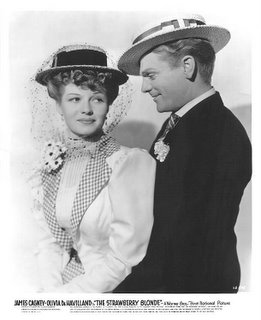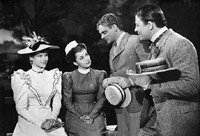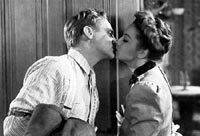
 The Strawberry Blonde (1941)
The Strawberry Blonde (1941)Director: Raoul Walsh
It is such a pleasure to talk about one of the most charming films ever made, The Strawberry Blonde. The deliriously happy marriage of a cast oozing with chemistry and giving pitch-perfect performances, delicate direction even during the more melodramatic moments, a mise en scene that is at once nostalgic and riotously lively, and some home truths in a smart script make for a very uncomplicated good time that lingers and begs to be repeated.
I don't know how many times I've watched this film. It used to be a staple on broadcast television, and as a young girl with a big crush on James Cagney, I'd set my alarm clock to wake me in the wee hours of the morning if it were being broadcast. (Those were the days before home video, if you younger readers can imagine that, and a film buff had to be more persistent.) It has become one of my all-time favorites, a feel-good film with staying power.
Cagney is at his affectionate best playing Biff Grimes, a scrappy young man trying to find his way in the world at the turn of the 20th century. He spends time taking correspondence course after correspondence course, landing and losing jobs in a single day, and mooning along with half the town's eligible young men after the lovely Virginia Brush, the strawberry blonde of the title. Rita Hayworth is as dishy and adorable in her puffy-sleeved crinoline as she was heartpoundingly sexy in her "Put the Blame on Mame" production number in Gilda. She knows just how to flash her smile, tilt her chin, and swing her skirts to get all heads turning.
Biff's friend Hugo Barnstead (Jack Carson) has his eye on Virginia, too, but he's too much a man of the world to pant at her heels. He's brash enough to speak to her and set up a date in the park. Virginia insists on bringing a friend to keep the meeting on the up-and-up, and Hugo drags Biff along to play nice with Virginia's friend, falsely luring Biff with the promise that Virginia is to be his date. This will not be the last or most serious lie Hugo tells Biff, but in a way, it is one of the luckiest lies Biff will ever hear.
Hugo and Biff set out for the park in their hired buggy, where they "happen" to run into Virginia and her friend Amy Lind (Olivia de Havilland). Hugo and Virginia go dancing about politely, "Aren't you the girl I saw in town today?" "Why I believe I am," until Amy cuts in with "Let's stop all this nonse
 nse. This is a prearranged date, and we all know it. I have to be back at work in an hour, so let's get on with it." Biff leans over to Hugo and whispers, "She's fast." An awkward moment occurs, the horse tries to eat the fake flowers on Virginia's hat, and Hugo spirits Virginia away, much to Biff's consternation. He doesn't like the forward, women's rights advocate that Amy presents herself to be. She implies that her grandmother was one of the original Bloomer Girls and that premarital sex is really no big deal. Thoroughly frightened, Biff runs off, shouting, "Oh, Hugo. HUGO!"
nse. This is a prearranged date, and we all know it. I have to be back at work in an hour, so let's get on with it." Biff leans over to Hugo and whispers, "She's fast." An awkward moment occurs, the horse tries to eat the fake flowers on Virginia's hat, and Hugo spirits Virginia away, much to Biff's consternation. He doesn't like the forward, women's rights advocate that Amy presents herself to be. She implies that her grandmother was one of the original Bloomer Girls and that premarital sex is really no big deal. Thoroughly frightened, Biff runs off, shouting, "Oh, Hugo. HUGO!"Biff continues his pursuit of Virginia who, to get him off her back, promises him a date in six weeks' time. When Biff arrives punctually for that date, Virginia, of course, has completely forgotten and tells him she must tend to her sick aunt. He is disappointed, planning as he has an evening of vaudeville and dinner at Tony Pastor's. Enticed by the lavish evening, Virginia boldly declares that she made a promise and will keep her word. Biff is on cloud nine as he escorts the beautiful Virginia all over town. Parting with all his money is painful, but then he has her in his arms as they dance to "And The Band Played On." A wink to the conductor changes the lyrics to "Biff Grimes would waltz with the strawberry blonde, and the band played on." Impressed by Biff's being "well-known," Virginia gives him a peck on the cheek. Biff falls head over heels in love on the spot.
Of course, Biff never had a chance. When he waits for Virginia at a prearranged location a short time later, Amy shows up instead. He's annoyed to see her, but crestfallen when he learns that Virginia has eloped with Hugo that afternoon. In an earlier meeting, Biff had tried to take advantage of Amy's professed easy morals by trying to kiss her. Amy was shocked and insulted, revealing her bold act to be a fraud. This revelation softened Biff toward her. When she tries to console Biff over the loss of Virginia, he asks if he might call on her sometime. Thus begins a genuine relationship between the two.
Hugo and Biff go into a construction business together, and Biff's sole job is to sign papers for a lot of shady dealings he knows nothing about. When inferior materials Hugo has been buying cause a building collapse, the law comes down hard on the business. Biff, who signed all the contracts, takes the fall and goes to prison. While in prison, he studies--by correspondence--to become a dentist and sets up a practice when he is released. Coincidentally, one Hugo Barnstead, suffering with a horrible toothache, interrupts his former partner on a Sunday for emergency dental work, not knowing it is Biff he is to see. The temptation to pay back his betrayer with a lethal dose of anesthetic faces Biff when they meet again.
The film is told in flashback, with the phone call to Biff's dental practice beginning the film. It is then we get to see all of the events I have described that lead up to this fateful meeting. Hugo and Virginia, greedy social climbers, were made for each other and play out their transaction of a relationship throughout the film, as Hugo becomes more whiny, pretentious, and ineffectual, and Virginia becomes more demanding, bitter, and shrewish. Amy's veneer of the independe
 nt woman melts swiftly, which always saddened me a bit, but she learns to become as genuine as Biff always has been through her love for him. As he is taken to jail in a gentlemanly fashion by his policeman friends, one look to her and a "Wait for me," communicates the world about what a touching and carefully modulated film this is. It goes from comedy to tragedy almost in the blink of an eye, but never without proper motivation having been built in beforehand. Great supporting performances by Alan Hale as Biff's father and George Tobias as Biff's friend Nick provide strong timber to a structurally tight and true film.
nt woman melts swiftly, which always saddened me a bit, but she learns to become as genuine as Biff always has been through her love for him. As he is taken to jail in a gentlemanly fashion by his policeman friends, one look to her and a "Wait for me," communicates the world about what a touching and carefully modulated film this is. It goes from comedy to tragedy almost in the blink of an eye, but never without proper motivation having been built in beforehand. Great supporting performances by Alan Hale as Biff's father and George Tobias as Biff's friend Nick provide strong timber to a structurally tight and true film. I note that The Strawberry Blonde is only available on VHS, but don't let that trouble you. The medium is unimportant in this case because the message is so golden. l


1 Comments:
At 7:10 PM, Anonymous said…
Anonymous said…
I always knew Raoul Walsh had a thing for strawberry blondes but I had no idea he made a film called it!
Post a Comment
<< Home